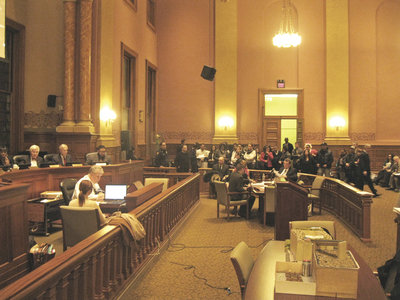Faced with the threat of losing federal funding for its Women, Infants, and Children (WIC) program, in January the city relocated the program’s office to one central location on Summit Avenue. This, according to city officials, will be a relatively temporary arrangement until more permanent facilities can be found later.
The city has been put on notice that its current operations did not meet federal requirements for adequate space and that the city program risked being defunded if it did not find a more suitable location.
The city had until this month to comply.
The City Council voted Jan. 29 to sign a two year lease with three one year options on a 21,000 square foot facility on Summit Avenue, although Councilman Richard Boggiano said he had some concerns about the use of trailers on the property and reports of a mold problem.
The city will pay $300,000 a year or about $25,000 a month to lease 15 classroom trailers, two trailers for use as restrooms and one building located on Storms Avenue as a garage.
While assured that the mold problem would be rectified, Boggiano questioned who would be responsible for the cleanup and maintaining the property.
“I don’t believe we should be renting the trailers,” Boggiano said, and asked about other options including owning a building for the services.
“It’s spread out through the HUB and not conducive to those who needed it.” – Diane Coleman
____________
The property is located south of Montgomery Street near the intersection with Baldwin, and not far from Hudson County Plaza – which houses many of the county services that WIC clients may also need.
The landlord is responsible for removing the mold and maintaining the property, while the city would be responsible for any upgrades, city officials said, including installation of phone, internet, furniture and other items connected to operations.
The city said the cost for installing Verizon and Comcast connections would likely be around $100,000.
Consolidates scattered services
Councilwoman Diane Coleman said the move was necessary even without the threat of the loss of funding. Offices for WIC were scattered over a large area, and often required those seeking services to go from one office to another just to get basic services.
“It’s spread out through the HUB and not conducive to those who needed it,” she said.
Martin Luther King Drive is often referred to as The HUB.
The WIC program is currently run out of an office at 384 MLK Drive and has a number of nearby spaces it uses for various aspects of the program. The WIC program provides federal grants to states for supplemental foods, health care referrals, and nutrition education for low-income pregnant, breastfeeding, and non-breastfeeding postpartum women, and to infants and children up to age five who are found to be at nutritional risk.
City officials said federal authorities put the city on notice that the current facilities did not meet the space requirements mandated by the federal government for the program, and said the city had to rectify the situation or face loss of funds.
“Putting it all at one location makes sense,” Coleman said.
The site will serve also as space for many of the Health Department’s operations.
Councilwoman Joyce Watterman said the WIC program is bursting at the seams and needs to be relocated.
Peter Garguilo, owner of the property, said the trailers had served as a charter school, which closed two or three years ago.
Boggiano, however, said the mold concerned him because workers were being brought into the site. While the owner said the mold was on the outside and would be remediated, Boggiano voted against the move, and raised concerns about people being relocated to the trailers.
“Putting the Health Department in trailers is a disgrace,” Boggiano said. “Spending well-over $300,000 in rent is a sin.”
Electric madness?
Although the city has made moves to install energy-saving lights in various parks and other places, the cost for electricity isn’t dropping. This is because the city has a fixed rate contract with PSE&G, said Coleman, who asked for an accounting of usage throughout city-own property.
Council members Coleman, Watterman, Candice Osborne and Michael Yun questioned the policy of changing lights – which can have a significant cost to the city – if the bill does not go down.
Annual electric costs incurred by the city are about $6.5 million. This is a standard contract, officials said, that does not go down even if the city’s usage does.
Yun said if the city uses less, it should pay less. This is the reason to install energy-saving lights. But the city is often mandated to make the change. The decision for changing to energy saving lights is often determined by the Planning Board, which may set this as a requirement for upgrades to parks and other city owned properties, officials said.
Al Sullivan may be reached at asullivan@hudsonreporter.com.
